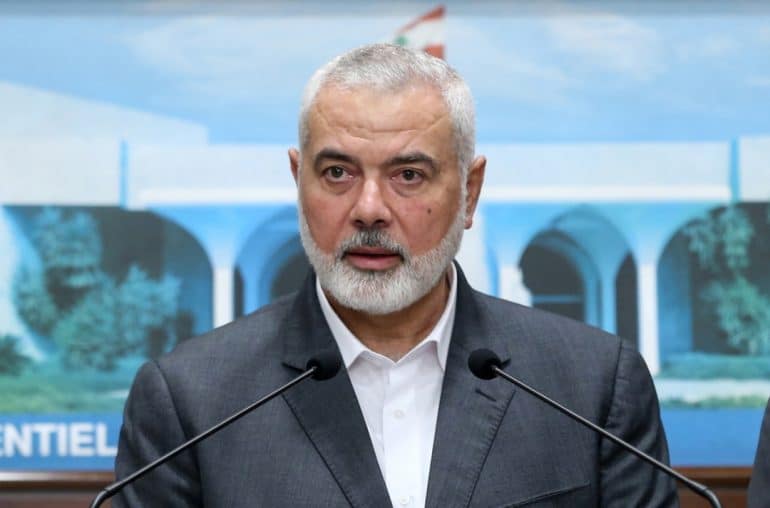The leader of Hamas emphasized that the death of three of his sons and his grandchildren in an Israeli bombardment is not going to bend the Palestinian Islamist movement, that it will not change its attitude or its positions in the talks to conclude a cease-fire agreement in the Strip Gaza, where Israeli bombardment continues, more than six months after the war broke out.
Yesterday Wednesday, Hamas announced that three sons and four grandsons of Ismail Haniya were killed in an airstrike in the Shati refugee camp in Gaza City (north), where they were visiting relatives, on the first day of the celebration of Eid al-Fitr, the completion of the holy month of Ramadan.
"I thank God for the honor of witnessing my three sons and some of my grandchildren," Mr Haniya, who is based in Doha, told Qatari broadcaster Al Jazeera. "The enemy targeted a vehicle they were riding in."
The Israeli military confirmed it had launched an airstrike against Mr Haniya's three sons, which it described as members of the military wing of "the terrorist organization Hamas".
The development came as mediators Qatar, Egypt and the US await a response from the Palestinian Islamist movement to a proposal they submitted to declare a ceasefire agreement, which would be accompanied by the exchange of hostages held in Gaza with Palestinian prisoners.
"I think the enemy can break the will of our people and push the leaders to make concessions (...) He can dream! The blood shed will make us even more indomitable," Mr. Haniya said. "Our demands are clear and we will not abandon them. If the enemy thinks that by targeting our son at the height of the negotiations, and before Hamas gives its answer, it will push the movement to change its position, it is delusional," he added.
Ismail Haniya, elected chairman of the 2017 Hamas politburo, lives between Qatar and Turkey.
Turkish President Recep Tayyip Erdogan offered his condolences yesterday, as did Iranian President Ibrahim Raisi and Lebanese Hezbollah's second-in-command, Naim Kassem, who contacted him, according to his movement.
Iran "Attack" on Israel?
At the same time, Iran is "threatening to launch a major attack against Israel," US President Joe Biden said in Washington, shortly after news broke of the death of Ismail Haniya's children and grandchildren, and also after Iran's supreme leader , Ayatollah Ali Khamenei, declared that Israel will be "punished" for the deadly attack on the Iranian consulate in Damascus on April 1.
A sign of the growing tension: German airline Lufthansa announced yesterday the suspension of flights to and from Tehran, possibly until today, due to "the current situation in the Middle East".
"As I have told Prime Minister (Israeli Benjamin) Netanyahu, our commitment to Israel's security in the face of these threats from Iran and its allies is unwavering," he continued. “I repeat: inflexible. We will do everything within our power to protect Israel's security," he insisted, while calling on Tehran's ally Hamas to "go ahead" and accept the Gaza ceasefire deal offer.
The proposal calls for a six-week ceasefire, the release of 42 Israeli hostages in exchange for 800 to 900 Palestinians held in Israeli prisons, the entry of 400 to 500 food trucks into the enclave each day and the return of northern Gazans to their homes. who were forced to leave because of the war, according to an AFP source in Hamas.
The Palestinian Islamist movement last week reiterated its conditions for a deal: a permanent cease-fire, the withdrawal of Israeli troops from the entire Gaza Strip, a large increase in aid to the civilian population, threatened by famine, throughout the enclave and "serious" hostage exchange agreement with Palestinian prisoners.
Despite calls for a ceasefire, Israeli shelling continues and this morning eyewitnesses reported that it is concentrated in the southern part of the enclave.
The war broke out on October 7, when Hamas's military arm launched an unprecedented raid from the Gaza Strip into southern parts of the Israeli territory, killing 1.170 people, most of them civilians, according to a French tally. Agency based on official Israeli data.
More than 250 people were kidnapped in the Hamas attack, of whom 129 are still in the Palestinian enclave — but at least 34 of them are believed to have been killed, according to Israeli sources.
In retaliation, the Israeli civil-military leadership has vowed to "wipe out" the Palestinian Islamist movement, which, like the US and the EU, characterizes as a "terrorist" organization, and the military operation it is conducting has so far killed at least 33.482 people , mostly women and children, according to the Hamas Health Ministry.
Aid "full of sorrow"
In the devastated Palestinian enclave, among the rubble, in tents or inside their homes - those who still have them - many Palestinians prayed, holding small sweets that many managed to make despite the dire shortages, celebrating Eid al-Fitr .
Under pressure from many capitals to allow more humanitarian aid into the tiny region under total siege, Israel says it has increased the number of trucks entering.
"In the last month, the daily average was 213, before that it was 170," Defense Minister Yoav Galland said yesterday. He added that the goal is to increase further, reaching an average of about 500 per day, via Egypt, the Israeli port of Ashdod and through the opening of new land crossings.
However, the Eretz crossing still remains closed.
For Ahmed Kista, a father of four, who took his family and went to seek refuge in Rafah, at the southern end of the enclave, the measures announced by the Israeli authorities have not changed anything so far. "We have never experienced an Eid like this, full of sadness, fear, destruction and annihilation," he told AFP.
In the Square of the Mosques in Jerusalem, Islam's third holiest site, worshipers were mindful of the war in the Gaza Strip, like Rawan Abd, a 32-year-old nurse, for whom this "is the saddest Eid we have ever experienced".
